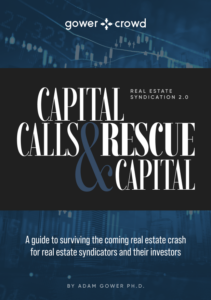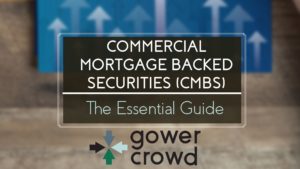Here’s What You Need to Know About Commercial Real Estate Tax Lien Investing
Most of us do not like paying property taxes, but we do it. Why? Most likely because we do not want our properties seized by the IRS, state governments, or city and county authorities. When someone fails to pay their property taxes, they have what is called a “tax lien” attached to their property, which gives them a set period of time- somewhere between six months and three years- to pay off the property. Savvy investors can purchase these liens directly from local municipalities and counties to generate income via interest on the lien or by eventually gaining the right to foreclose on and keep the property.
What is Tax Lien Investing?
Tax lien investing describes the process of purchasing the delinquent tax lien on a property and generating a return with this purchase, either through interest paid by the original property owner or via the sale of the underlying collateral securing the loan. By buying the delinquent tax lien, you also purchase the right to take the deed to the property should the owner not pay the full delinquent tax amount, in addition to fees, with a set redemption period, which is typically around 120 days.
Benefits and Disadvantages of Tax Lien Investing
Like other investment assets, tax lien properties come with their own unique set of advantages and disadvantages. What is most important is that you understand the myriad rules and regulations pertaining to tax lien investing, the redemption period, the bidding process, and return rates. Each of these rules and regulations will differ from state to state, so it is important that you do your research before taking on a tax lien investment in an unfamiliar region.
Enroll in our newsletter to receive weekly tips and resources that you won’t find anywhere else.
Benefits
Stable Rate of Return
When compared to other forms of property investing, like fix and flips, tax lien investments enjoy relatively stable rates of return. The ability to forecast your ROI more effectively will protect you from volatility and help you plan out your financial future.
Low Capital Requirements
While most real estate investments outside of equities and REITs can require tens or even hundreds of thousands of dollars to get started, tax lien certificates offer investors the ability to generate returns with as little as a few hundred dollars.
Fixed Sum Payments
If a delinquent property owner pays current everything owed on the property the lien gets paid off and since this is a fixed amount upon the tax lien investment settlement, you can plan ahead and determine to the dollar how much you will receive for your investment, and your actual rate of return. Additionally, you will get all of the proceeds all at once, rather than in the form of monthly payments, like you would with a cash flowing property or dividend-paying REIT.
Possibility of owning the underlying real estate
Most tax lien investors are less interested in being paid off by the owner, and more interested in owning the underlying real estate. If the owner does not pay off the money owed to settle the lien, you could end up owning the property itself, and this can mean substantially higher returns assuming the value of the property is more than the price you paid for the lien.
The downside, typically, of tax lien investing is that the property owner pays off the lien and makes all debts current; the upside is that they do not, and you end up with the real estate.
Disadvantages
Many Competing Investors
Owing perhaps to some of the advantages outlined above, you are probably going to face a fair bit of competition for the best tax lien deals. In any market where there is money to be made you’ll face a fair amount of competition, and it scales up with the potential rewards in the space.
No Steady Income
Unlike commercial or residential rental properties, or dividend-paying REITs, you will not receive a steady income from tax lien investments. As we mentioned above, many investors like the idea of a relatively quick, upfront sum, but if your personal investment goals require a steady, long-term income, you might want to consider other types of real estate assets.
Potential Subsequent Liens
Although many tax lien deals have low initial capital costs, some deals will require injections of more capital from time to time due to the fact that when you become the initial lien holder you are also required to buy any subsequent liens. Thoroughly researching tax liens is therefore imperative to ensure there are no other liens against the property that supersede your rights, that clean title can pass to you (not so easy), that the real estate itself is of the value you are assuming (in most cases, you will not be able to inspect the property), and that the process of getting ownership of the property (if that’s your goal) or being paid off by the owner (if that’s your goal), is clearly understood.
The Process of Buying Tax Liens
Investors generate returns with tax liens in two ways, by taking direct ownership of the property, or by receiving payments from current owners. In most cases, you will purchase a tax lien from a real estate auction.
Tax liens are designated by individual counties, so before setting out to buy a tax lien, you want to zero in on a particular county or region in which you would like to invest. In many cases, areas that are seeing low or even negative economic growth are replete with these properties.
After homing in on a single (or multiple) areas in which you wish to buy, go take a look at a few of the properties featured in the auction. Unfortunately, auctions often prevent potential buyers from doing a walkthrough of the property, but that does not mean you can’t drive past and take a look at the outside to see if you can get a feel for the overall condition of the property.
After this step, you are going to want to make a list of the properties you are interested in, and head down to the real estate auction. These days, post-COVID, many of these auctions are online, but that will depend on the specific county. Determine your max bid for each property before the auction- and do not get carried away- remember, you’re in this to make a profit, not to beat the other bidder. Have cash or a cashier’s check on hand to pay after you win the bid- but again, check with your local county beforehand to ensure they take your preferred payment method.
Ways to Invest in Tax Lien Funds
If this buying process does not appeal to you, or you simply do not have the time, you can invest in tax liens through special investment funds. Numerous companies have created private placement funds for the specific aim of investing in tax lien certificates. In this scenario, you are pooling your cash with other investors, while the entire enterprise is guided by a professional fund manager or investment company- you basically act as capital while they act as the boots on the ground.
Profiting From a Tax Lien
When you purchase a tax lien, you are generally required to pay back the total amount of the lien to the issuing body, whether that is a city, county, state, etc. In the vast majority of states in the Union, the tax lien issuer collects the interest, principal, and other penalties, then pays the lien certificate holder, and finally collects the lien certificate if it isn’t on file.
After this step, the property owner is obligated to repay the investor the total amount of the lien, including interest- which ranges between 10% and 12.5%, depending on the state. If investors paid more than the lien is worth, aka a premium, this amount might be added to the repayment schedule, again depending on the local codes and laws. If the property owner is unable to pay the lien within the standard six month to three year repayment period, the tax lien investor has the option to foreclose on the property much in the same way the state, city, or county would be able to.
FAQ of Tax Liens
What is a Tax Lien?
When property owners get a tax lien, it means that the local authority, aka the government, has made a claim against your property because you have failed to pay your taxes. With a property tax lien, it usually means you have not paid your city or county taxes- this gives the local authority the right to put a lien on the property in question.
What is the Tax Lien Sale Process Like?
Currently, 29 states, including Puerto Rico, The US Virgin Islands, and Washington DC allow for tax lien sales, and each of these areas has different rules and regulations surrounding tax lien sales.
In most cases it goes something like this: a property owner may fail to pay their taxes. After a grace period, usually a few months to a few years, the tax collector gets involved. When this happens, unpaid taxes are auctioned off via a tax lien sale, either online or via a physical auction. These auctions are either awarded to the highest bidder, or the investor who chooses to accept the lowest interest rate with the lien. After this, tax collectors collect the money earned at auction to make up for unpaid back taxes. After the lien is transferred to the investor, the current property owner owes them the amount of unpaid property taxes, including interest, lest they face foreclosure on the property.
What if a Property with a Tax Lien has a Mortgage?
The lien is attached directly to the property, while the mortgage is still the borrowers responsibility- it stays on their credit report until arrangements are made with the lender, or the mortgage is paid in full. A tax lien is usually the only type of lien that supersedes a mortgage lenders claim to the property as collateral. Put another way, owning the tax lien supersedes the mortgage holder’s rights, and if you foreclose on the property to satisfy the lien, the mortgage lender will be wiped out and lose everything – other than any claims they may have remaining with the original borrower.
Related: When is a Value Add Property a Good Real Estate Investment?
Where do you find Tax Liens for Sale?
Tax liens are sold by county or city tax collectors, either online or via an in-person auction. Many counties or cities will keep this information online on their city websites, even if they do not offer online auction opportunities.
Conclusion
Commercial tax lien investing is not for the faint of heart, but it is an integral part of how our property system operates. After all, without property taxes, how will cities and counties maintain the public goods that we all share, like roads, sewage and gas lines, tree and grassland maintenance? Investors looking for a clearly defined, upfront payment, with the opportunity to eventually own the underlying real estate collateral, have a lot to gain from this field, and with the rise of online auctions, have access to more tax liens than ever.
Remember that no form of investing comes risk free, but if commercial tax lien investing meets your risk/reward profiles, and you feel comfortable with the process, there are certainly opportunities in the space.
Stop hunting for investors—let them find you. Explore how to pitch your deals and attract investors from the GowerCrowd podcast.
If you liked this article and would like to learn more about real estate investing, check out some of the resources below:
Newbie
If you want to build your wealth and earn passive income from real estate investing and are looking at deals on marketplace platforms or through developers online, then I recommend you start by the 8 Key Financial terms so you can understand every deal you look at.
The 8 Financial Keys are not only a great way to get started, they are also essential to understanding how you’ll make money in any real estate deal.
You’ll learn the most important financial concepts you need to know in real estate investing that apply to every type of real estate no matter the asset class (office, industrial, residential, hospitality, retail).
Intermediate Investor
If you’ve got some online real estate investments under your belt already and are beginning to receive passive income checks each month, or have been paid off with profit – or (hopefully not) are finding that some deals are not quite panning out the way you expected, then check out this page for a wealth of free resources.
Here I cover everything from beginner all the way to very advanced real estate concepts.
You’ll find podcasts with developers, researchers, professors and other industry experts, detailed articles, and lots of videos, both short and long that are all easily searchable and totally free.
Advanced Investors
I am not shy about being straightforward about real estate investing; it is exciting, lucrative, and can help you build wealth and income as part of your investment portfolio, but it is not without its risks.
As an advanced investor you know this already, so I’ve put together a webinar for you that guides you through one of the most important components of real estate investing: Real Estate Contracts – reading between the lines.
This is advanced learning and based off conversations I had with three of the top real estate attorneys in the country, combined with my own personal experience. Access it here; it could be the most important webcast you watch all year.
RELATED ARTICLES





